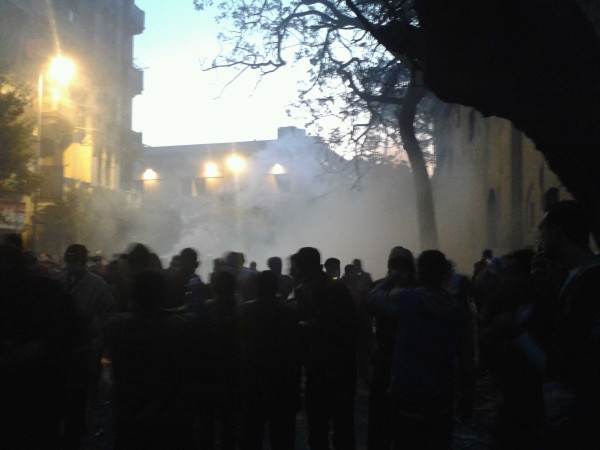Egypt Analysis: So What Happens Now? (El Amrani)
 Wednesday, November 23, 2011 at 8:02 |
Wednesday, November 23, 2011 at 8:02 |  Scott Lucas in
Scott Lucas in  EA Middle East and Turkey,
EA Middle East and Turkey,  Middle East and Iran
Middle East and Iran  Dawn Near Tahrir Square Issandr El Amrani writes on his blog The Arabist:
Dawn Near Tahrir Square Issandr El Amrani writes on his blog The Arabist:
So, the Field Marshal [Mohamed Hussein Tantawi, head of the Supreme Council of the Armed Forces] has given his speech, and lo and behold, it was a dull speech that did not offer a clear way to pacify the crowds in Tahrir. It did make a significant concession, to be sure, in a quick mention that the SCAF was willing to hold the presidential elections by July. That should have been its centerpiece. It would have been better if announced by a credible new cabinet, or at least PM,who said there was real independence. And if it has offered a head or two to the angry crowds for the last few days' violence.
I went down to the area where the fighting is taking place today and I have an uncomfortable take on it: it's that the fighting is being sustained by the protestors, not by the police, who right now appear satisfied with holding the line to prevent the protests from reaching the Interior Ministry at Lazoughly Street. They may be violent, but they are not on the offensive, even if many protestors think they are preventing them from returning to the square. They are paying for the excessive force they used over the weekend.
More than that, there is this ambience of martyrdom. Everyone is excited and wants to participate, to get their chance to be a hero. People are angry — and they have a right to be. But right now it's an open-ended process, and the crowds want the satisfaction of achieving what did they in January: to see the man in their sights fall.
Things are out of control right now. You don't have the more unified leadership that existed in Tahrir last February. It is foolishness to think that you can fine tune a response to these emotions and come out with a solution. Consider that last Friday the Muslim Brothers and Salafists gave us a big show of their opposition to the army's conditions for the supra-constitutional amendments, and then immediately lost control of the protests they started. (Not to belabor that point.)
Even [Tuesday] morning no one expected the turnout there is tonight. Just imagine what there might be on Friday. At this rate, the situation will be calmed one of two ways: massive force by the police and army, which seems unlikely for now, or a much grander gesture than what Tantawi is offering tonight, one with a convincing vision for Egypt's future.
I don't like saying what I would do, because I'm not Egyptian and Egyptians don't like foreigners telling them what to do. We've been through the options for a national unity government, and my understanding is that ElBaradei — who refused to meet with SCAF today (how's that for political instinct?) — does not want to be annointed PM by the generals. He wants a popular mandate and guarantees of non-interference, that arrogant bastard!
Other options circulated today, like a transfer of power to the judiciary, don't make much sense to me, even if you have a figure like Ahmed Mekky who has popularity. And I'm not sure the military would accept the arbitrary handover to a civilian presidential council just like that.
Tantawi could resign his post as minister of defense, and Sami Enan step up. But I'm not even sure that alone would end protests.
Perhaps what you need is one or more of the above combined with real contrition for the foot-dragging of the last two months. A revolutionary gesture, like the end of the current Mubarak trial and a real revolutionary tribunal of key former regime figures. A real transitional justice process. The nationalization of assets of key figures (as was done in Tunisia), and their use for a fund for the martyrs. A real look at changing the social contract.
The failure of SCAF's transition over the last nine months is not theirs alone. It is that of a good part of the political class that said nothing when key former regime figures where left alone for months, and [former President Hosni] Mubarak was in Sharm al-Sheikh with his sons. It is that of the Egyptian elite that went back to its privileged lifestyle and did nothing to address the social injustice in the country — not to always compare things to Tunisia, but there the private sector, trade unions and the government got together and negotiated 10-15% salary increases across the board. They bought social peace by renegotiating the social contract.
In Egypt you get the feeling that the upper class has completely ignored the social roots of the January uprising, and at the same time backed a return to similar kinds of politics of patronage, where parties and movements try to buy the poor with handouts and cheap meat at Eid. People don't want to be given charity, they want to be given social rights. This too is political — it's not about economic mismanagement. It's not about an uprising of the poor. It's about the political vision for a social economy.
Whether it's about police brutality, social change or politics, my feeling is that Egyptians want to feel like they've actually had a revolution. Whoever gives them that feeling might win the people in Tahrir over.

Reader Comments